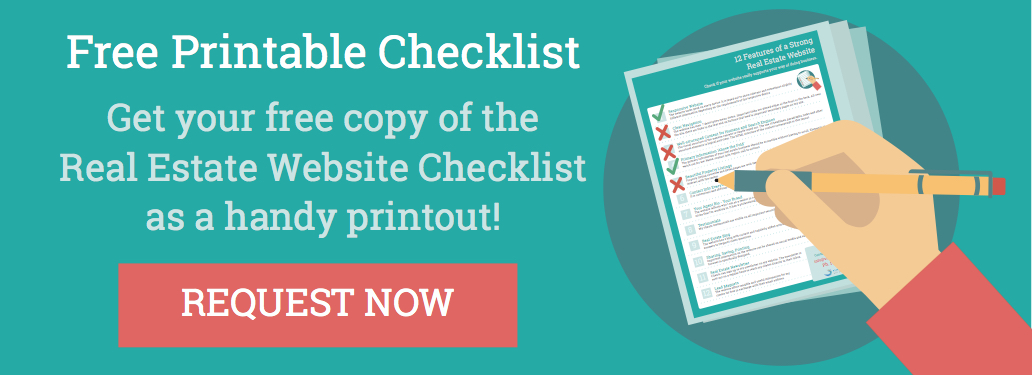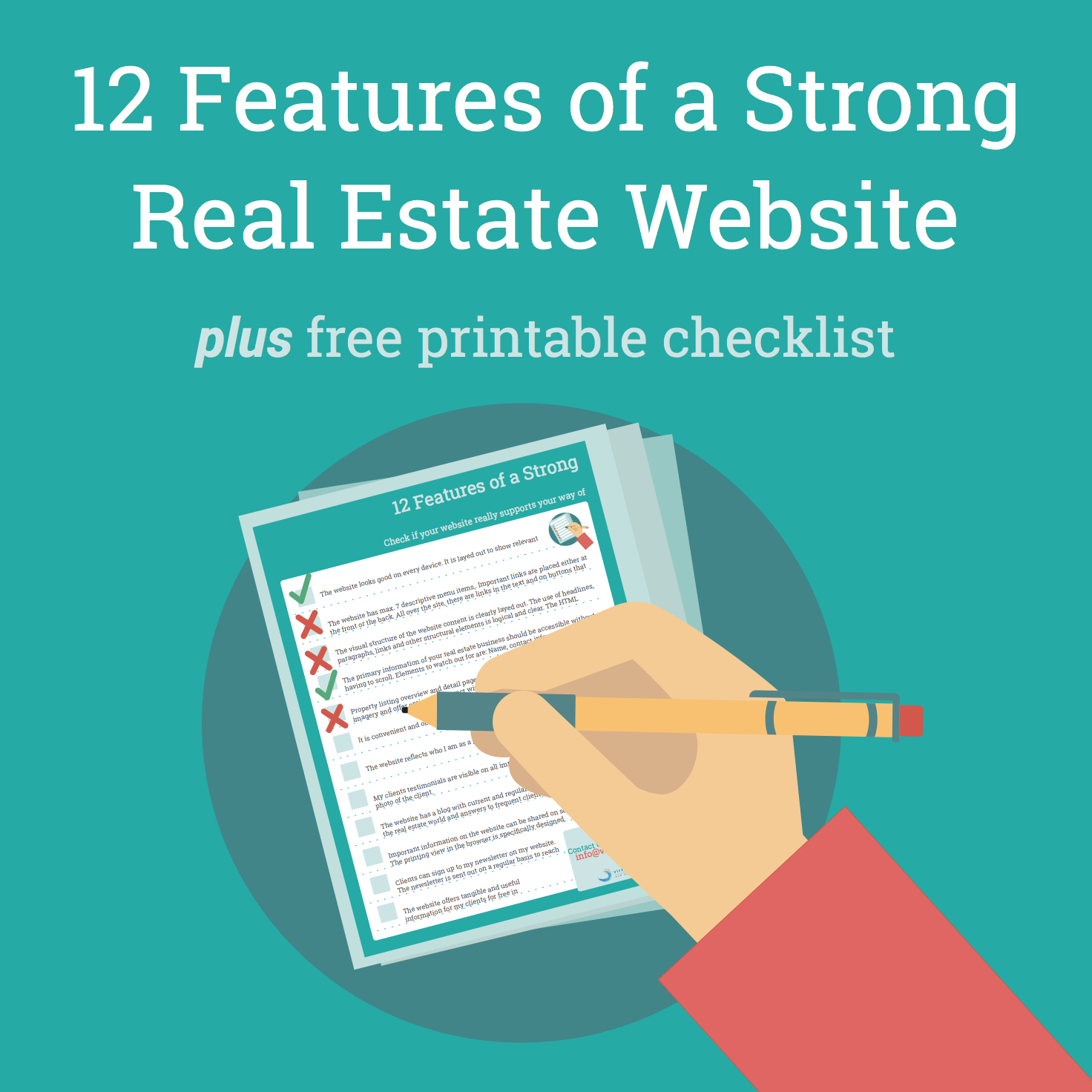
Can your Real Estate Website Do This?
Wouldn't it be wonderful, if your real estate website truly represented your unique way of conducting your business; if it communicated clearly, and without a doubt, what makes you stand out compared to your competitors?
We believe building your website on the basis of your business concept is your (only) way to achieve exactly that. It might take strategizing and planning ahead, but a targeted website development process will pay back the efforts many times over.
When analysing an existing website, or planning a new website, we're looking for the following features and how well they are adapted to your unique selling proposition.
Take a critical look at your web presence and decide if your website can do this.
1. Responsive Website
More than 60% of all real estate buyers state that they used their phone to search for suitable homes. This comes at no surprise: We know that since about 2013 the portion of time that we spend on the internet on our mobile devices is larger than the time we spend browsing on our desktop computers. In 2017, mobile usage makes up for about two thirds (source) of all digital minutes that we spend online.
It's no longer a question whether we have to build real estate websites that can display content on our phones. We have to take our considerations a step further and try to understand how your clients use a desktop computer versus their phones. Which information will they be trying to access on their phones and what are their expectations when they are on their desktop computers? With this knowledge, content blocks might have to be shifted and call-to-actions might have to be defined and positioned differently depending on which device is used.
2. Clear Navigation
Navigation through your website should be clear, concise and intentional. To achieve this, the main navigation of your real estate website should follow a few guidelines.
- Limit the items of your navigation to seven or less items. Research says that the short term memory is not able to handle more items, and we don't want to overload your clients' brains.
- Be descriptive - Instead of calling your blog "Blog" and your about page "About", it might make sense to call it "Real Estate News" and "Frank's Bio" instead. A word of caution, though: long wordy navigation items are not recommended either, so finding a compromise is often necessary.
- Positioning - In order to comply with what we know about attention span, place the most important links either in the front or back.
- Interlinking - Navigation is not just made up by the top links on every page. It is also important to conceptualize interlinking on your website so that you create a natural flow to your high-priority second level pages (i.e. property listings, real estate news, home buyer/seller sections, about page). Visitors will appreciate finding what they are looking for quickly and search engines reward this kind of structure with increasing authority for your site. Both results lead to higher rankings.
3. Well-structured content for your visitors and for search engines
Real estate information online follows similar rules than offline. The clearer your content is structured, the more descriptive your headlines are worded and placed, and the better your paragraphs are written, the more informative your writing is going to be perceived.
Other structuring elements are numbered or bullet point lists, bold & italic formatting as well as imagery that is selectively placed in the flow of the article.
If you have a visually well-structured and well-worded article, humans are likely to reward this by sticking to it till the end. For search engine robots, who are "blind" to human esthetics, we have to take it one step further and make sure that the HTML structure of your text represents the visual hierarchy of your content.
For example, robots that crawl your site don't know the difference between a normal paragraph, or a word in the paragraph that is increased in size. However, if the HTML structure represents the headline with the header tag <h1>, they will be able to understand that this headline is hierarchically most important and read the structure better.
No idea about your code structure? No problem, please contact us if you require help to analyze the HTML structure of your existing web content. We're happy to help (for free).
4. Primary Information "Above The Fold"
The fold? You ask. What is the fold? Most real estate websites today are scrollable; they are longer than the screen that they are viewed on. The area that can be viewed right away without scrolling is what the web design world calls "above the fold".
It comes at no surprise that the primary information of your real estate business should be accessible right away without further searching. It is for every realtor to determine what her or his primary information is, but the usual elements that should be visible right away are
- your name,
- your contact information,
- the region you are operating in and
- a visually well placed call-to-action link that leads to important lead generating pages. (On real estate websites, this is often the link to your listings page or a way to find out about the value of the viewer's property.)
5. Beautiful Listings
Many realtors consider a listing feed an integral part of their website. In the last years the look and the opportunities for lead generation have been enhanced.
Home buyers or sellers have probably been on many big websites, such as realtor.ca, and are used to an interface that provides all necessary information quickly and offers well-designed options to interact. In order to keep up with this level of your clients' expectation, some features to pay attention to are:
Property Listing Overview
- Clickable image
- MLS® number
- Option to favour
- Filter options
- All info at a glance
- Clear "more info" button
Property Listing Detail Page
- Map
- Images
- Videos (drones or virtual open houses)
- Brochures
- Print option (that curates a great printout)
- Social share option
- Property Listing details well presented
- Easily accessible contact agent button
6. Contact Info to the Realtor Everywhere
Many real estate agents agree that contacting them is the most important job of a real estate website. Visitors should be able to identify important contact information effortlessly. Phone numbers should turn into links as soon as they access a site via a phone, so that one click generates contact.
Check if your contact info is placed on every page and on every listing to make it convenient and obvious to reach you.
7. Your Agent Bio - Your Brand
In the real estate industry, your brand is you and how you conduct business.
The first questions to ask are:
- Does my real estate website in general reflect who I am as a realtor?
- Do the colours work?
- Is the content representative of my focus in my business?
- Is the tone of the content in line with how I use my voice in my professional life?
These considerations are especially important when it comes to your 'ABOUT' page. Often neglected, it has the big job to represent your brand. Visitors who come to your site need to be able to find out who you are and what makes you stand out from other real estate agents. We recommend an 'ABOUT' page that considers the following elements:
- It shows off your skill set and possibly the real estate niche you are working in (condos, luxury homes, geographical area, corporate real estate etc).
- It represents you visually with a high-quality and professional photo.
- It is short and easy to read.
- It represents your way of doing business truthfully.
- It has your contact info easily accessible.
A short summary of your 'ABOUT' page together with a picture and contact details constitute a valuable element on your real estate website's front page; and, with a simple link, it offers quick access to your more detailed agent bio.
If you want to take it to the next level, create a video of yourself! Putting video material on your website is considered one of the most effective marketing tools these days.
8. Testimonials
Another tool to market your real estate brand is to collect testimonials. This is no secret. There are testimonial pages out there everywhere. However, they frequently lack in vitality. To make testimonials from home buyers and sellers work a bit harder for you, place them everywhere on your site, not only on your testimonial page. Add a client's photo and they become real social proof. If people can associate a face with the positive evaluation of your work, credibility increases and they will remember it much better.
If you want to go above and beyond, try to get videos of your clients' testimonials.
9. Real Estate Blog - Creating Authority
If you're looking to get better results in search engines, a blog might be one of your best bets.
Climbing up in Google's ranks can be broken down to three pillars:
- Technology (Is the website built properly?)
- Relevance (Is the content in line with the purpose of the site)
- Authority (Are you a credible source for your field of work?)
Your blog is your magic weapon to show relevance and build authority. By adding new articles on a regular basis, you show that your content is relevant for your field of work.
With useful and interesting articles, you also show that you are an expert in your field. This and a number of high-quality back links to your page will set you up for high rankings - and you're useful to your clients as well.
We suggest coming up with a list of relevant topics that you encounter when supporting your clients to sell or buy real estate on a regular basis or that your clients ask you about often. Decide on a schedule you can commit to with the help of an editorial calendar. Use your expertise, do research and write your blog articles. To learn more about planning a blogging concept click here.
10. Sharing, Saving, Printing
You work hard to create a website that your (future) clients find appealing and informative. In giving them the option to share your blog or property listings on social media or by email, you've added automated advertising to your real estate website.
However, try to stay classy here, less is more. Decide which content of your website is share worthy (blog, listings...), and stick to these rather than overloading every page with social media links.
Especially in the real estate business, clients often want to print out listing details or fact sheets. You have two options to satisfy this need:
- Add a brochure to all of your property listings that can be easily downloaded or printed. (A pdf-format is recommended.)
- Make your listing detail page printer-friendly by adding specific visual styling options that only apply for the browser's printer view. Not sure why? Have you ever tried to print a listing right from the browser? Try it out. It usually looks rather unsightly. This can be corrected programmatically and every web designer should be able to help you there.
11. Real Estate Newsletters to maintain relationships
Email marketing is one of the leading online marketing tools and will remain so for the time being. Why? Because nothing beats sending information to your clients' inboxes. You can have a great website but it is still hard work to get people to go there. It's much more effective to send them the information they need.
A monthly real estate newsletter could contain elements such as:
- neighborhood news,
- new listings,
- market information,
- interesting articles that you found on the internet (with source of course).
Like blog writing, this might appear a daunting task at first but offering usable quality content together beautiful imagery in a well-designed and well-worded e-mail to home buyers and sellers can pay back many times over. Here's why.
-
First and foremost, you are building a reputation with your audience. They will soon view you as the real estate expert in your niche or area. They will also keep you in mind. And that might be your advantage to many of your competitors, because there is that scary statistic that 70% of your clients have forgotten the name of their real estate agent after only a year! If you keep sending them useful information around the area, the real estate market trends and new offers, chances are, they will return when they plan on selling their in three years (and even remember your name).
- Secondly, your audience will grow. People like to share high quality content with their friends and on social media.
However, as with almost all online marketing tools, it's a marathon and not a race. It will take a bit of time effort to build up an audience base. Click here to find some inspiration from Realtor Mag.
12. Supporting Info or "Lead Magnets" for Realtors
One way to grow your email list is to give your website visitors and clients incentives to share their email address with you. I don't know about you, but I'm picky when it comes to sharing my email address on the internet.
However, I'm prepared to give it as a token of gratitude to receive content that I deem useful to me. This free content is called "Lead Magnets" among online marketers, because they are so hard to resist.
Here are a few real estate topics that make magnificent lead magnets:
- 10 basic steps to stage your house
- How to sell your house for more
- Buying in the XYZ area
- Neighborhood Profiles etc
If this sounds like a lot of work, keep in mind that you can always reuse your information. You could write a blog about staging a home and then use the 10 best ideas to create a little print out as a pdf.












